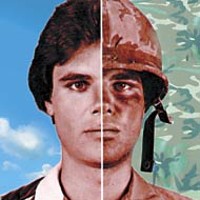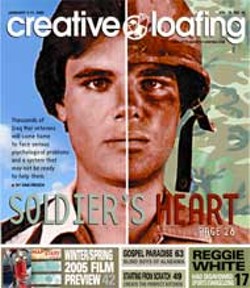Soldier's Heart
Thousands of Iraq War veterans will come home to face serious psychological problems and a system that may not be ready to help them.
By Dan FroschPage 4 of 6
A December 2003 Army study -- published in The New England Journal of Medicine -- found that approximately 16 percent of soldiers returning from Iraq were suffering from Post Traumatic Stress Disorder (PTSD), a psychologically debilitating condition causing intense nightmares, paranoia and anxiety. But that study is, already, out of date.
Now, after a particularly bloody summer and fall, many military and mental health experts predict the rate of PTSD will actually run nearly twice what the Army study found, to approximately the same level suffered by Vietnam veterans. Others think it could spike even higher and note that rarely before has such a dramatic rate of PTSD manifested itself so early.
At the same time, there is mounting concern over the system designed to help: The Department of Veterans Affairs. Numerous reports show the VA does not have many of the essential services veterans desperately need.
Finally, in 1979, the VA opened up its own network of storefront "vet centers." A year later, the American Psychiatric Association recognized PTSD as a legitimate medical diagnosis.
When the National Vietnam Veterans Readjustment Study concluded in 1988 that 30 percent of Vietnam vets suffered from PTSD, not many were surprised.
By then, Lifton (who never worked for the VA) and individual VA psychiatrists like Matthew Friedman had become leading experts on PTSD, and pushed the condition into psychiatric and public consciousness.
Through group and individual therapy, and sometimes medication, the VA was helping veterans heal, though the process could take years.
But by the time U.S. soldiers touched Iraqi soil, because of the enormous growth in the number of vets seeking mental health services and the VA's failure to adequately respond, the advancements in PTSD treatment were being compromised.
A new conflict, which bore an uneasy resemblance to Vietnam for the doctors who knew that war's demons, would test those advancements even further.
As Crystal Luker tells it, May 5, 2004 was the day her husband's platoon ran into trouble.As usual, on that afternoon, Specialist Ron Luker was patrolling a section of Baghdad with his 1st Cavalry Division platoon.
"There was a lieutenant in the first Humvee, Ron was in the second and his platoon sergeant was in the third with a group of privates," Crystal says.
A 19-year-old specialist from Tulsa named James Marshall, whom Ron had been looking after, also rode in the third Humvee. As the convoy snaked through a teeming Baghdad street market, there was an explosion.
"The lieutenant was yelling over the radio for all of them to haul ass back to the base because they were coming under fire," Crystal says.
When Luker looked behind him, he was horrified. The third Humvee was gone. He flipped his vehicle around and hurtled back down the street.
Crystal says Luker told her when they found the Humvee, the force of the blast had blown the flesh from two of the privates all over the seats. When Luker looked in the back, he saw Marshall, wrapped around the vehicle's 50 caliber gun.
"When Ron tried pulling James' body out, his hands just went right inside of him. He pulled James' flak jacket back and his chest was gone."
Before that day, Luker called and wrote home religiously, unburdening himself to the woman he'd fallen in love with at a Mariposa, Calif., restaurant four years earlier. But when he came home to Fort Hood, Texas, for a week in August, things changed dramatically.
That first night, at a welcome-home barbecue, Luker cornered his wife in the kitchen.
"He asked why I'd been avoiding him and said that I didn't want to be around him," Crystal says. When Luker started cursing, some army friends pulled him away. "You didn't come all the way home to fight with your wife," they told him.
As the week went on, there was more arguing. Crystal says her husband accused her of cheating while he was gone. He rifled through her purse, the bedroom drawers, and repeatedly listened to old phone messages, searching for proof.
"I told him, "You're scaring me! You're not acting right, Ron!'" Crystal says.
Luker also seemed bothered around his three daughters. In an emotional revelation, he told his wife why.
"He said he'd turned into a monster in Iraq. How he couldn't bounce his kids on his knee when he'd shoved guns in women's faces and busted into houses and pushed kids on the floor. He kept saying "I'm just trying to remember who I was before.'"
Ron Luker's problems fit into those of the growing numbers of PTSD soldiers. They also signal another trend -- soldiers experiencing PTSD early.
Latest in Cover
More by Dan Frosch
-
Iraq War Vets Still Underserved
Jul 27, 2005 -

Soldier's Heart II
Mar 9, 2005 -

If Ashcroft Were Uninsured...
Mar 17, 2004 - More »
Calendar
-

Queen Charlotte Fair @ Route 29 Pavilion
-

NEW WINDOW GALLERY-Pat Rhea-ACRYLIC PAINTINGS-April 05-30 2024 VALDESE, NC 28690 @ New Window Gallery/Play It Again Records
- Through April 30, 12 p.m.
-

TheDiscountCodes
-

Wine & Paint @ Blackfinn Ameripub- Ballantyne
-

Face to Face Foundation Gala @ The Revelry North End










